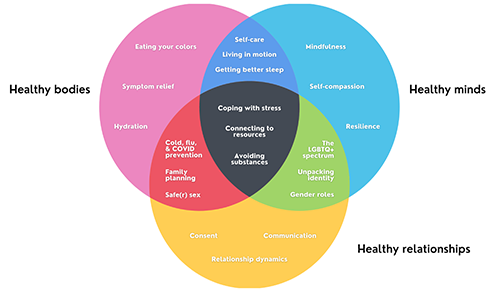The Center for Community Health and Education (CCHE) has provided a continuum of comprehensive medical, mental health, health education and youth development services to adolescents and adults in Northern Manhattan and the Bronx for over 40 years.
The CCHE is comprised of:
- The Family Planning Center and its co-located Young Men's Clinic
- Seven School-Based Health Centers serving more than 20 New York City schools
- NYPeers, a teen peer education and leadership program
- Community and classroom-based health education and teen pregnancy prevention programming
- Universal school-based mental health promotion and prevention interventions
Our goals are to:
- Provide primary healthcare services to adolescents that include medical, mental health, and health education
- Prevent early childbearing and delay initiation of first intercourse
- Increase the use of effective contraception among sexually active men and women who are not seeking pregnancy
- Reduce the transmission of sexually transmitted infections, including HIV
- Support the healthy transition from adolescence to adulthood
Our health promotion interventions aim to improve health outcomes for adolescents; promote preventive health care services including reproductive health and family planning services for adolescents; support social-emotional development, healthy relationships for adolescents; support home and community relationships and environments that support health; and to decrease disparities in all health outcomes among adolescents in our Northern Manhattan and Southwest Bronx communities. These interventions allow our SBHCs and Family Planning Practice to have a greater impact on the community and reach young people who may not have made a visit to our health centers.
Teen Pregnancy Prevention (TPP)
CCHE’s TPP intervention delivers health education in school, community and clinical settings, youth development and supportive services, internships, programming targeting males and access to free family planning services and supplies in a community-based health center and in seven school-based health centers.
Our TPP intervention is a multi-faceted approach that includes:
- Prevention education emphasizing the benefits of abstinence, the effectiveness of contraception, and overall health and wellness
- Male involvement in reproductive health
- Adults involved in the lives of young people (parents, school staff, mentors)
- Access to sexual health care services at community-based Family Planning Practice and Young Men’s Clinic and seven school-based health centers.
Prevention Education in Schools & Community Settings
- Classroom education using an evidence-based pregnancy prevention curriculum is delivered to 8th and 9th grades.
- Individual supportive education and guidance provided by health educators in small group and individual sessions in school and health center settings.
- Video- and tablet-based education delivered to students in the SBHC center waiting rooms.
- Male involvement programming and group sessions.
- Education workshops held within schools and community venues.
- NYPeers, a peer educator internship program training and deploying teens to conduct health education sessions at our high schools and in the community while developing leadership and professionalism skills.
Mental Health Universal Prevention
Our mental health and health education clinicians conduct universal mental health prevention programming at all SBHC campuses with workshops and classroom interventions for students, faculty and parents throughout the year to raise students, staff or families' mental health awareness, encourage help-seeking for mental health concerns and promote positive behaviors.
Our three-tiered intervention model employs
- universal interventions for the school community to raise students, staff or families' mental health awareness, encourage help-seeking for mental health concerns and promote positive behaviors (such as a social-emotional learning curriculum or school-wide anti stigma campaign);
- selective interventions that aim to detect mental health needs and intervene early with students who are at risk of mental health problems (such as broad-based screening to identify children in need of further assessment or trainings for teachers to identify and respond to students in psychological distress); and
- targeted mental health services and interventions that are provided to students with specific mental health difficulties/conditions to lessen the impact of the condition and improve functioning (including mental health treatment using evidence-based models).
Interventions include establishing student support groups around identity and emotional health, workshops for parents on mental health issues, adolescent development and parent-child communication and supporting professional development for school staff on bullying, depression, suicide and high risk concerns. The NYPeers supports these interventions with peer education and leadership to promote emotional wellness, mental health awareness and the availability of supportive services.
NYPeers
The NYPeers Wellness Educator Program (NYPeers) is a holistic, integrative, youth-driven peer education program across five public high school campuses in upper Manhattan and the Bronx. NYPeers follows a skills-based training model which familiarizes teen peer educators with core principles of health communication and education and empowers them to conduct outreach and educational activities in their school communities on a variety of topics including illness prevention, mental and emotional health, sleep, self-care, nutrition, physical activity, substance use, and sexual and reproductive health. An annual cohort of 30-40 students is recruited through a competitive application process to participate in a year-long internship for which they receive a monetary stipend. Peers participate in an intensive five-week summer training and go on to conduct adolescent health promotion activities at their campuses and in their communities throughout the school year

The two pillars of the NYPeers program are 1) a comprehensive and intersectional approach to teen health which contextualizes the decisions teens make around their health in the bigger picture paired with 2) a skills-based training model which empowers the Peers to develop effective outreach activities and targets points of intersection to maximize the positive impact at the individual and community level.
The NYPeers curriculum and program are built around a holistic framework of interconnected behaviors and health topics in the domains of healthy bodies, healthy minds, and healthy relationships.
Contact us
NewYork-Presbyterian Ambulatory Care Network
Center for Community Health and Education, CCHE Manager:



